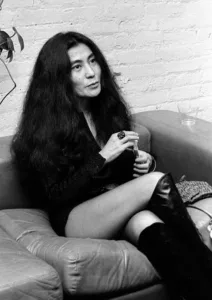
Yoko Ono stands as a figure of multifaceted creativity, whose influence transcends traditional boundaries of art and activism. Born on February 18, 1933, in Tokyo, Japan, Ono’s journey has been marked by an unyielding commitment to pushing artistic boundaries, advocating for peace, and challenging societal norms.
Ono’s early life was shaped by the cultural and political landscape of Japan during World War II.
This formative period deeply influenced her later work, instilling in her a profound desire for peace and understanding. Moving to New York City in the late 1950s, she became an integral part of the avant-garde art scene, immersing herself in the Fluxus movement.
At the heart of Ono’s artistic expression lies a radical reimagining of traditional forms.
Her conceptual art and performance pieces often defied categorization, inviting viewers to question established norms and participate in the creation of meaning.
Works like “Cut Piece” (1964), where audience members were invited to cut away pieces of her clothing, exemplify her penchant for challenging notions of power, vulnerability, and agency.
However, it was her relationship with John Lennon, one of the founding members of The Beatles, that catapulted Ono into the global spotlight.
Their partnership transcended the realms of art and music, sparking controversy and fascination in equal measure.
Together, they embarked on a journey of creative collaboration, blending their distinct talents to produce works like “Bed-Ins for Peace” and the iconic album “Double Fantasy.”
Yet, amidst the fame and scrutiny, Ono remained steadfast in her commitment to using her platform for social change.
Her advocacy for peace and activism against war and injustice became central themes in her work. Through projects like “Imagine Peace” and “War Is Over! (If You Want It),” she sought to inspire global unity and collective action towards a more harmonious world.
Beyond her artistic endeavors, Ono’s impact extends into the realms of feminism and environmentalism. She has been a vocal advocate for women’s rights, challenging patriarchal structures and advocating for gender equality.
Additionally, her environmental activism underscores her belief in the interconnectedness of all life forms and the urgent need for ecological stewardship.
As Ono celebrates another year of life, her legacy continues to resonate with audiences around the world. Her fearless experimentation, unwavering activism, and boundless creativity serve as a testament to the transformative power of art and the enduring pursuit of peace.
In a world marked by division and strife, Yoko Ono’s voice remains a beacon of hope, reminding us all of the potential for positive change through imagination and action.
